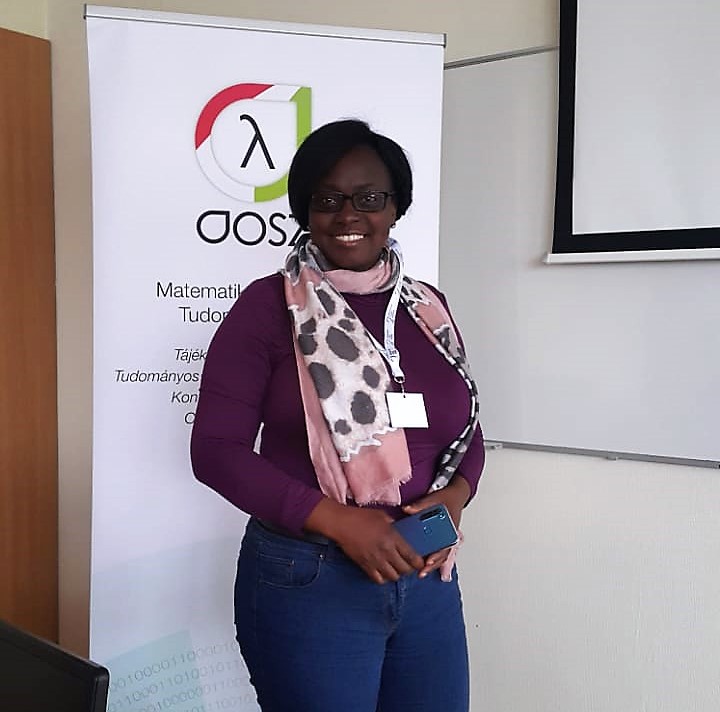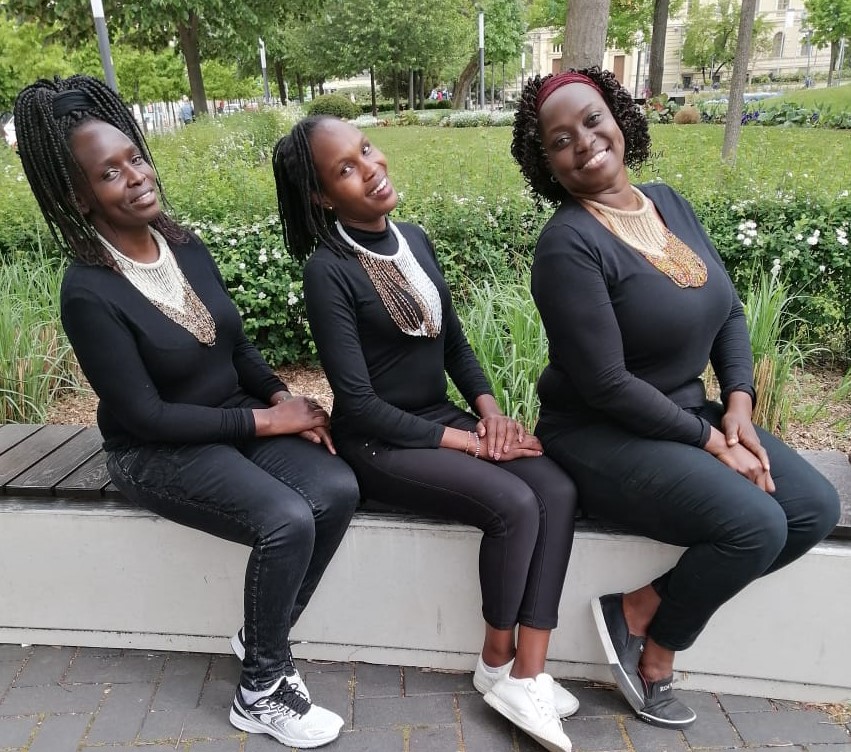This time again we introduce you to one of our volunteers of our international team with 30 people from 215 countries speaking 23 different languages. In this chapter of our volunteer series, you can read Dr. Lillian Achola Oluoch’s story from Kenya! She studied in Hungary and did her doctoral degree between 2016-2021 at the University of Szeged and now she is a Lecturer in the Department of Statistics and Computational Mathematics, at The Technical University of Kenya, Nairobi, Kenya.
Why did you choose Hungary and the University of Szeged?
Mathematics is an important factor in life, it forms a good framework for all human activities in various fields such as health, information technology, and economics. Also, I get fascinated with the intricate world of data, and not only do I find statistics intellectually stimulating, but I also strongly feel that it possesses a unique appeal due to its practical applications. For this reason, my research interest evolved along the statistics line and wished to pursue it further. In the process of searching for research opportunities that particularly focused on this field, I came across a call for the Stipendium Hungaricum scholarship program. In the process of searching for a top-ranked research university in Hungary with a good reputation in the fields of natural sciences, I came across the University of Szeged which was my first choice.
I felt extremely honoured to receive admission to this great university. I was also satisfied with the quality of Hungarian higher education as one of the best in the world, with superb infrastructures, great research opportunities, and a highly ranked group of professors. The Ph.D. programs in Hungary are unique in that they provide new perspectives on fundamental scientific issues while also contributing to sustainability and economic development. One of the good reasons for choosing Hungary is the relatively low living costs compared to the rest of Europe.
How did you like your studies? What was your favorite memory during your studies?
First and foremost, I have been studying in my home country of Kenya my entire life, and this was an excellent opportunity to change my learning environment. I enjoyed my studies comfortably in air-conditioned and brightly illuminated, well-equipped with high-calibre projectors and expansive rooms fitted with high-speed Internet access. Not to forget a very important place Klebelsberg Library (TIK), a huge and spacious building surrounded by lush greenery and vibrant colored flowers, a good environment indeed for acquiring knowledge.
Secondly, the professors fully and continuously supported my research from the start to the finish by catering for all conferences, workshops, and publications. Additionally, studying in Hungary has provided me with a unique and exclusive opportunity to meet people from different backgrounds, and various cultures and traditions. This provided a platform for gaining invaluable international experience and making friends and establishing great networks from all over the world.

How did you like the country?
As the saying goes 'Beauty lies in the eyes of the beholder', as for me I cannot express enough the spectacular exquisite beauty of Hungary using mere words. The infinite beauty of Hungary ranges from the geographical features to the warm people with rich culture and traditions. It was really amazing walking in the capital city Budapest and other cities in Hungary. Szeged is a city of high stature juxtaposed with well-maintained ancient buildings. Dom tér in Szeged stands out with stunning craftsmanship, one of the most beautiful cathedrals I have been to. I could not miss visiting Lake Balaton and the famous site in Tihany every summer holiday or having a picnic along the river Danube or feeling the cool breeze coming from the expansive River Tisza with all the breathtaking views. I miss the spectacular natural hot springs like Széchenyi Thermal bath in Budapest and Anna bath in Szeged. I cannot forget the numerous festivals that depicted the tradition of the Hungarian people. The hot wine festivals, paprika festival, the light festivals, Debrecen flower carnival, international fish fair and bridge fair in Szeged etc. The Hungarian cuisines Paprikás Csirke with a top-up of Palinka was just mind-blowing. The Hungarian people were so welcoming, friendly, warm, and honest and made me really feel at home when I was miles away from home.
Did you have any difficulties with the Hungarian culture? What was that and how did you handle it?
Being in the first cohort of Stipendium Hungaricum scholars from Kenya, I had no link to someone who could assist me from the Budapest Liszt Ferenc Airport to Szeged Pályaudvar(Szeged Train station) where my mentor was waiting to receive me. And this was the genesis of my trouble, the communication barrier. When I got onto the bus, the instructions were in Hungarian and I could not figure out what ‘Következő’ meant. In the end, when I dropped off the bus from the airport to Ferihegy, Igen (yes) Köszönöm (Thank you) Szia! (Hi) was my first Hungarian words learned in a span of about 15 Minutes. This is when it dawned on me that I had a lot more work to do. I enrolled in Hungarian classes which became so useful in my day-to-day activities. I am also impressed by the initiative that most people in Hungary have taken to learn English and this has made life very easy in terms of communications, especially for international students.
How does the Hungarian culture differ from the Kenyan culture?
Despite Hungary and Kenya being on different continents, each country has its rich cultural heritage. There are some similarities which include a change in family structures i.e families becoming smaller and diminishing of extended families. Another similarity is that their cultures have become less traditional such that traditional regalia have been replaced by international patterns.
However, there are also many areas where the cultures seem to be different. Firstly, the most traditional cultural element in Hungary is its cuisine and the most distinctive element of Hungarian cuisine is paprika hence making very hot spicy dishes. Unlike in Kenya where the dishes are not as hot because of using mild spices rosemary, cinnamon and ginger. The stable food in Hungary is bread while in Kenya it is ‘Ugali’ made from maize flour accompanied by some green vegetables ‘Sukuma wiki’.
Kenya is a multilingual country. Swahili is the national language, while the official language is English. Furthermore, there are over forty other indigenous languages spoken by different ethnic groups in Kenyans. In Hungary, there is one official language which is Hungarian (magyar). When it comes to marriages in Kenya, Polygamy was once a common practice, but it is becoming less common today unlike in Hungary which practices only monogamy. There is also a dowry system in Kenya that does not exist in Hungary. This is whereby payment of some form is made to the bride's family by the groom's family. Dowry serves to fulfill justice and legality in the eyes of the families involved. Kenya has many different wedding traditions which vary between tribes furthermore, traditional weddings are often followed by a religious one.

You are among alumni volunteers. Why did you apply for that position? What's your task and how do you manage it? What do you think about the Alumni Network Hungary?
My motto has always been ‘giving back to the community'. Although it is hard to find time because of busy life schedules, I consider volunteering to offer vital help to people in need, worthwhile causes, and the community at large. Owing to the great experience I had studying in Hungary, I applied to be an Alumni volunteer to establish professional networks not only in Kenya but Africa at large by liaising with like-minded alumni communities in different African countries. I have volunteered in many education and scholarship fairs organized by the Embassy of Hungary in Nairobi, through the Education Hungary office.
Alumni Network Hungary is one of the most unique initiatives that bring together all former students, professors, and staff to foster a strong sense of belonging. It contributes to the formation of strong professional networks, broadens opportunities for incoming students, strengthens relationships with the university, as well as provides opportunities for lifelong learning, personal growth, and development by learning new skills, and even advancing in a career.
What's your plan for the future?
My future plans revolve around two important things in life. Firstly, to achieve academic excellence, and a successful career in teaching and research. As a lecturer at The Technical University of Kenya, I would wish to leave a legacy for the next generation of researchers. I'd like to share specialized knowledge with students, and encourage them to participate in research activities by pointing to them the potential research directions. I would like to inspire the female students to take up courses in sciences and engineering which are currently dominated by their male counterparts.
Secondly, I also intend to continue with my research work in the field of statistics and its application to other areas. My long-term research interests include Stochastic models, Statistical modelling and analysis for stochastic processes, rare events estimation, Mathematical Statistics, and Applied probability.
Last but not least, I desire to pursue postdoctoral training, to advance in developing statistical methods for the estimation of different model specifications. I envisage working with research-based groups in statistics from the international and local universities with an aim of improving research and human resource capacity building. This calls for proper motivation and preparedness to follow this exhilarating and arduous path. The opportunity will provide a solid foundation for my career goals and also new technical training for career development activities.